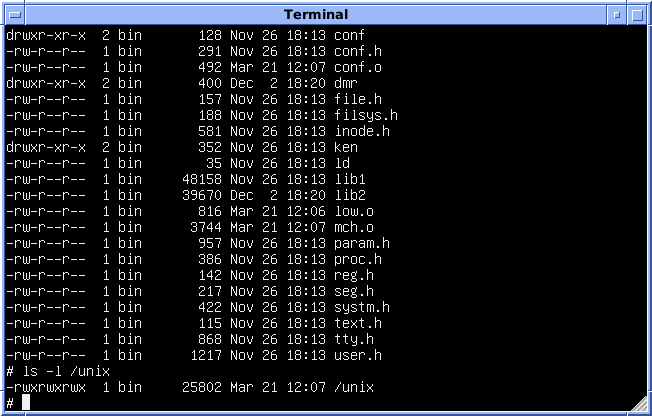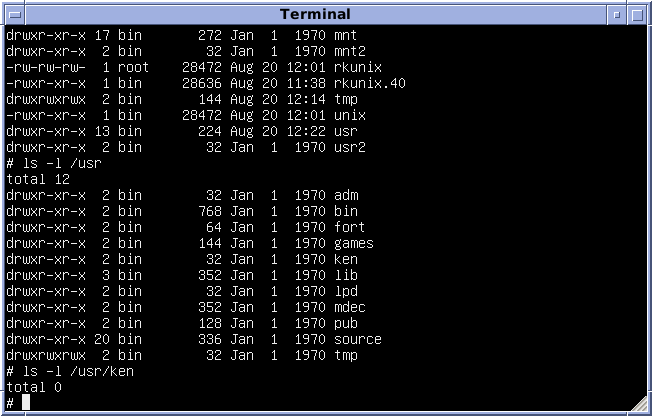Ancient UNIX on:
[Wikipedia]
[Google]
[Amazon]


 Ancient UNIX is any early release of the
Ancient UNIX is any early release of the
The Unix Heritage Society
(TUHS), a website dedicated to the preservation and maintenance of historical UNIX systems
code, disk images, and related
at TUHS
Unix First Edition Manual PagesRestoration of 1st Edition UNIX kernel sources from Bell Laboratories
Bell Labs Unices Discontinued operating systems {{Unix-stub


 Ancient UNIX is any early release of the
Ancient UNIX is any early release of the Unix
Unix (; trademarked as UNIX) is a family of multitasking, multiuser computer operating systems that derive from the original AT&T Unix, whose development started in 1969 at the Bell Labs research center by Ken Thompson, Dennis Ritchie, and ot ...
code base prior to Unix System III, particularly the Research Unix
The term "Research Unix" refers to early versions of the Unix operating system for DEC PDP-7, PDP-11, VAX and Interdata 7/32 and 8/32 computers, developed in the Bell Labs Computing Sciences Research Center (CSRC).
History
The term ''Resear ...
releases prior to and including Version 7 (the base for UNIX/32V
UNIX/32V is an early version of the Unix operating system from Bell Laboratories, released in June 1979. 32V was a direct port of the Seventh Edition Unix to the DEC VAX architecture.
Overview
Before 32V, Unix had primarily run on DEC PDP-11 ...
as well as later developments of AT&T Unix
The history of Unix dates back to the mid-1960s, when the Massachusetts Institute of Technology, AT&T Bell Labs, and General Electric were jointly developing an experimental time-sharing operating system called Multics for the GE-645 mainframe.
M ...
).
After the publication of the Lions' book, work was undertaken to release earlier versions of the codebase
In software development, a codebase (or code base) is a collection of source code used to build a particular software system, application, or software component. Typically, a codebase includes only human-written source code files; thus, a codeb ...
. SCO first released the code under a limited educational license.
Later, in January 2002, Caldera International
Caldera International, Inc., earlier Caldera Systems, was an American software company that existed from 1998 to 2002 and developed and sold Linux- and Unix-based operating system products.
Caldera Systems was created in August 1998 as a spinoff ...
(now SCO Group
The SCO Group (often referred to SCO and later called The TSG Group) was an American software company in existence from 2002 to 2012 that became known for owning Unix operating system assets that had belonged to the Santa Cruz Operation (the ...
) relicensed (but has not made available) several versions under the four-clause BSD license
BSD licenses are a family of permissive free software licenses, imposing minimal restrictions on the use and distribution of covered software. This is in contrast to copyleft licenses, which have share-alike requirements. The original BSD lic ...
, namely:
*Research Unix
The term "Research Unix" refers to early versions of the Unix operating system for DEC PDP-7, PDP-11, VAX and Interdata 7/32 and 8/32 computers, developed in the Bell Labs Computing Sciences Research Center (CSRC).
History
The term ''Resear ...
: (early versions only)
** Version 1 Unix
** Version 2 Unix
** Version 3 Unix
** Version 4 Unix
** Version 5 Unix
** Version 6 Unix
Sixth Edition Unix, also called Version 6 Unix or just V6, was the first version of the Unix operating system to see wide release outside Bell Labs. It was released in May 1975 and, like its direct predecessor, targeted the DEC PDP-11 family of ...
** Version 7 Unix
Seventh Edition Unix, also called Version 7 Unix, Version 7 or just V7, was an important early release of the Unix operating system. V7, released in 1979, was the last Bell Laboratories release to see widespread distribution before the commercial ...
*** UNIX/32V
UNIX/32V is an early version of the Unix operating system from Bell Laboratories, released in June 1979. 32V was a direct port of the Seventh Edition Unix to the DEC VAX architecture.
Overview
Before 32V, Unix had primarily run on DEC PDP-11 ...
, there has been no widespread use of the code, but it can be used on emulator systems, and ''Version 5 Unix'' runs on the Nintendo
is a Japanese Multinational corporation, multinational video game company headquartered in Kyoto, Japan. It develops video games and video game consoles.
Nintendo was founded in 1889 as by craftsman Fusajiro Yamauchi and originally produce ...
Game Boy Advance
The (GBA) is a 32-bit handheld game console developed, manufactured and marketed by Nintendo as the successor to the Game Boy Color. It was released in Japan on March 21, 2001, in North America on June 11, 2001, in the PAL region on June 22, 2 ...
using the SIMH
SIMH is a free and open source, multi-platform multi-system emulator. It is maintained by Bob Supnik, a former DEC engineer and DEC vice president, and has been in development in one form or another since the 1960s.
History
SIMH was based on ...
PDP-11
The PDP-11 is a series of 16-bit minicomputers sold by Digital Equipment Corporation (DEC) from 1970 into the 1990s, one of a set of products in the Programmed Data Processor (PDP) series. In total, around 600,000 PDP-11s of all models were sold, ...
emulator
In computing, an emulator is hardware or software that enables one computer system (called the ''host'') to behave like another computer system (called the ''guest''). An emulator typically enables the host system to run software or use pe ...
. ''Version 6 Unix'' provides the basis for the MIT xv6
xv6 is a modern reimplementation of Sixth Edition Unix in ANSI C for multiprocessor x86 and RISC-V systems. It was created for pedagogical purposes in MIT's Operating System Engineering course in 2006.
Purpose
MIT's Operating System Enginee ...
teaching system, which is an update of that version to ANSI C and the x86 or RISC-V platform.
The BSD
The Berkeley Software Distribution or Berkeley Standard Distribution (BSD) is a discontinued operating system based on Research Unix, developed and distributed by the Computer Systems Research Group (CSRG) at the University of California, Berk ...
vi text editor
A text editor is a type of computer program that edits plain text. Such programs are sometimes known as "notepad" software (e.g. Windows Notepad). Text editors are provided with operating systems and software development packages, and can be us ...
is based on code from the ed line editor in those early Unixes. Therefore, "traditional" vi could not be distributed freely, and various work-alikes (such as nvi NVI or nvi may refer to:
* nvi, a text editor
* Avial NV, an airline
* ''no value indicator'', a non-denominated postage stamp
* Navoiy Airport, in Uzbekistan
* Negative volume index, a financial analysis method
* ''Nationale Vliegtuig Indust ...
) were created. Now that the original code is no longer encumbered, the "traditional" vi has been adapted for modern Unix-like
A Unix-like (sometimes referred to as UN*X or *nix) operating system is one that behaves in a manner similar to a Unix system, although not necessarily conforming to or being certified to any version of the Single UNIX Specification. A Unix-li ...
operating systems.
SCO Group, Inc. was previously called Caldera International. As a result of the SCO Group, Inc. v. Novell, Inc.
''SCO v. Novell'' was a United States lawsuit in which the software company The SCO Group (SCO), claimed ownership of the source code for the Unix operating system. SCO sought to have the court declare that SCO owned the rights to the Unix code, ...
case, Novell, Inc. was found to not have transferred the copyrights of UNIX to SCO Group, Inc. Concerns have been raised regarding the validity of the Caldera license.
The Unix Heritage Society
First edition Unix was restored to a usable state by a restoration team from the Unix Heritage Society in 2008. The restoration process started with paper listings of the source code which were in Unix PDP-11 assembly language.References
External links
The Unix Heritage Society
(TUHS), a website dedicated to the preservation and maintenance of historical UNIX systems
code, disk images, and related
at TUHS
Unix First Edition Manual Pages
Bell Labs Unices Discontinued operating systems {{Unix-stub